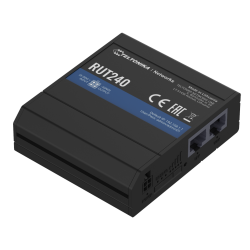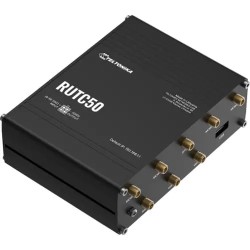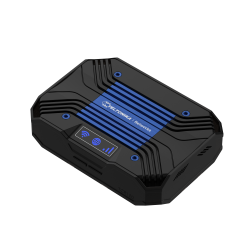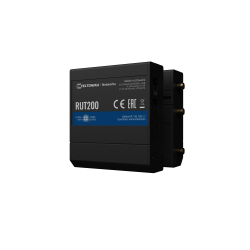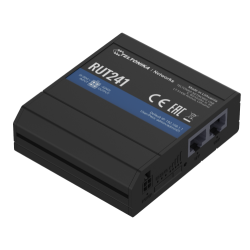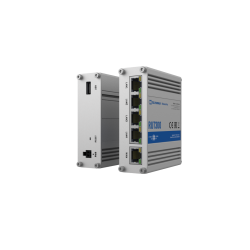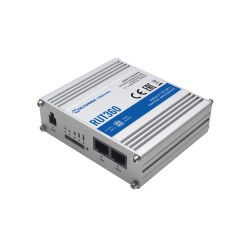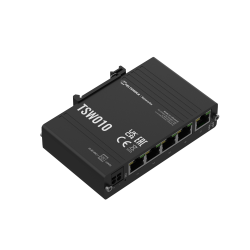
Teltonika TRB142 Industrial LTE RS232 Gateway
Livraison:
Le TRB142 est livré avec une interface RS232 largement utilisée pour la gestion des périphériques distants.
Il est équipé de capacités et de logiciels LTE Cat 1 critiques basés sur OpenWRT, offrant ainsi un haut degré de personnalisation.
Tout comme les autres produits de la série TRB, il fournit une large gamme de fonctionnalités logicielles telles que le contrôle SMS, VPN, IPsec, Firewall, et fota support.
Cette passerelle est durable, offre une large gamme de tensions d’alimentation électrique, et est compatible avec Teltonika Networks Remote Management System (RMS).
Related Products

Teltonika TRB142 Industrial LTE RS232 Gateway
| MOBILE | |
| Mobile module | 4G (LTE) – Cat 1 up to 10 Mbps, 3G – Up to 42 Mbps, 2G – Up to 236.8 kbps |
| Status | Signal strength (RSSI), SINR, RSRP, RSRQ, EC/IO, RSCP Bytes sent/received, connected band, IMSI, ICCID. |
| SMS/Call | SMS status, SMS configuration, send/read SMS via HTTP POST/GET, EMAIL to SMS, SMS to EMAIL, SMS to HTTP, SMS to SMS, scheduled SMS, SMS autoreply, Call utilities |
| USSD | Supports sending and reading Unstructured Supplementary Service Data messages |
| Black/White list | Operator black/white list |
| Band management | Band lock, Used band status display |
| APN | Auto APN |
| Bridge | Direct connection (bridge) between mobile ISP and device on LAN |
| Passthrough | Gateway assigns its mobile WAN IP address to another device on LAN |
| Multiple PDN | Possibility to use different PDNs for multiple network access and services |
| NETWORK | |
| Routing | Static routing |
| Network protocols | TCP, UDP, IPv4, IPv6, ICMP, NTP, DNS, HTTP, HTTPS, SMTP, SSL v3, TLS, PPP, SSH, DHCP, SNMP, MQTT |
| Connection monitoring | Ping Reboot, Wget Reboot, Periodic Reboot, LCP and ICMP for link inspection |
| Firewall | Port forwards, traffic rules, custom rules |
| DHCP | Static and dynamic IP allocation |
| QoS / Smart Queue Management (SQM) (planned) | Traffic priority queuing by source/destination, service, protocol or port |
| DDNS | Supported >25 service providers, others can be configured manually |
| SSHFS | Possibility to mount remote file system via SSH protocol |
| SECURITY | |
| Authentication | Pre-shared key, digital certificates, X.509 certificates |
| Firewall | Pre-configured firewall rules can be enabled via the WebUI, unlimited firewall configuration via CLI; NAT; NAT-T |
| Attack prevention | DDOS prevention (SYN flood protection, SSH attack prevention, HTTP/HTTPS attack prevention), port scan prevention ( SYN-FIN, SYN-RST, X-mas, NULL flags, FIN scan attacks) |
| Mobile quota control | Set up custom data limits for SIM card |
| WEB filter | Blacklist for blocking out unwanted websites, Whitelist for specifying allowed sites only |
| Access control | Flexible access control of TCP, UDP, ICMP packets, MAC address filter |
| VPN | |
| OpenVPN | Multiple clients and a server can run simultaneously, 12 encryption methods |
| OpenVPN Encryption | DES-CBC, RC2-CBC, DES-EDE-CBC, DES-EDE3-CBC, DESX-CBC, BF-CBC, RC2-40-CBC, CAST5-CBC, RC2-64-CBC, AES-128-CBC, AES-192-CBC, AES-256-CBC |
| IPsec | IKEv1, IKEv2, supports up to 5 x VPN IPsec tunnels (instances), with 5 encryption methods (DES, 3DES, AES128, AES192, AES256) |
| GRE | GRE tunnel |
| PPTP, L2TP | Client/Server services can run simultaneously, L2TPv3 support |
| ZeroTier | ZeroTier VPN |
| WireGuard | WireGuard VPN client and server support |
| SERIAL COMMUNICATION MODES | |
| Modes | Console, OverIP, Modem (Full or Partial control), MODBUS RTU master, MODBUS gateway, NTRIP client (planned) |
| MODBUS | |
| MODBUS TCP SLAVE | |
| ID filtering | Respond to one ID in range [1;255] or any |
| Allow remote access | Allow access through WAN |
| Custom registers | MODBUS TCP custom register block, which allows to read/write to a file inside the router, and can be used to extend MODBUS TCP slave functionality |
| MODBUS TCP MASTER | |
| Supported functions | 01, 02, 03, 04, 05, 06, 15, 16 |
| Supported data formats | 8 bit: INT, UINT; 16 bit: INT, UINT (MSB or LSB first); 32 bit: float, INT, UINT (ABCD (big-endian), DCBA (little-endian), CDAB, BADC), HEX, ASCII |
| MODBUS RTU MASTER | |
| Suported baud rates | From 300 to 115200 |
| Supported functions | 01, 02, 03, 04, 05, 06, 15, 16 |
| Supported data formats | 8 bit: INT, UINT; 16 bit: INT, UINT (MSB or LSB first); 32 bit: float, INT, UINT (ABCD (big-endian), DCBA (little-endian), CDAB, BADC), HEX, ASCII |
| Number of data bits | From 5 to 8 |
| Number of stop bits | 1 or 2 |
| Parity | None, Even, Odd |
| Flow control | None, RTS/CTS, Xon/Xoff |
| MQTT GATEWAY | |
| Gateway | Allows sending commands and receiving data from MODBUS Master trough MQTT broker |
| DNP3 | |
| Supported modes | TCP Master, DNP3 Outstation, RTU Master |
| DATA TO SERVER | |
| Protocol | HTTP(S), MQTT, Azure MQTT, Kinesis |
| MONITORING & MANAGEMENT | |
| WEB UI | HTTP/HTTPS, status, configuration, FW update, CLI, troubleshoot, system log, kernel log |
| FOTA | Firmware update from sever, automatic notification |
| SSH | SSH (v1, v2) |
| SMS | SMS status, SMS configuration, send/read SMS via HTTP POST/GET |
| Call | Reboot, Status, Mobile data on/off, Output on/off, answer/hang-up with a timer |
| TR-069 | OpenACS, EasyCwmp, ACSLite, tGem, LibreACS, GenieACS, FreeACS, LibCWMP, Friendly tech, AVSystem |
| MQTT | MQTT Broker, MQTT publisher |
| JSON-RPC | Management API over HTTP/HTTPS |
| MODBUS | MODBUS TCP status/control |
| RMS | Teltonika Remote Management System (RMS) |
| IoT PLATFORMS | |
| Cloud of Things | Allows monitoring of: Device data, Mobile data, Network info, Availability |
| ThingWorx | Allows monitoring of: WAN Type, WAN IP Mobile Operator Name, Mobile Signal Strength, Mobile Network Type |
| Cumulocity | Allows monitoring of: Device Model, Revision and Serial Number, Mobile Cell ID, ICCID, IMEI, Connection Type, Operator, Signal Strength, WAN Type and IP |
| Azure IoT Hub | Can send device IP, Number of bytes send/received/ 3G connection state, Network link state, IMEI, ICCID, Model, Manufacturer, Serial, Revision, IMSI, Sim State, PIN state, GSM signal, WCDMA RSCP WCDMA EC/IO, LTE RSRP, LTE SINR, LTE RSRQ, CELL ID, Operator, Operator number, Connection type, Temperature, PIN count to Azure IoT Hub server |
| SYSTEM CHARACTERISTICS | |
| CPU | ARM Cortex-A7 1.2 GHz CPU |
| RAM | 128 MB (50 MB available for userspace) |
| FLASH storage | 512 MB (200 MB available for userspace) |
| FIRMWARE / CONFIGURATION | |
| WEB UI | Update FW from file, check FW on server, configuration profiles, configuration backup |
| FOTA | Update FW/configuration from server |
| RMS | Update FW/configuration for multiple devices |
| Keep settings | Update FW without losing current configuration |
| FIRMWARE CUSTOMIZATION | |
| Operating system | RutOS (OpenWrt based Linux OS) |
| Supported languages | Busybox shell, Lua, C, C++ |
| Development tools | SDK package with build environment provided |
| INPUT/OUTPUT | |
| Configurable I/O | 2 x Configurable Inputs/Outputs. Digital input 0 - 5 V detected as logic low, 8 - 30 V detected as logic high. Open collector output, max output 30 V, 300 mA (not available in TRB142*2****) |
| Output control | HTTP POST/GET, Schedule |
| Events | SMS, EMAIL |
| I/O juggler | Allows to set certain I/O conditions to initiate event |
| POWER | |
| Connector | 4 pin industrial DC power socket |
| Input voltage range | 9 – 30 VDC (4 pin industrial socket), reverse polarity protection, surge protection >33 VDC 10us max |
| Power consumption | < 5 W |
| PHYSICAL INTERFACES (PORTS, LEDS, ANNTENAS, BUTTONS, SIM) | |
| RS232 | 1 x DB9 socket |
| I/Os | 2 x Configurable I/O pins on 4 pin power connector (I/O not available in TRB142*2****) |
| USB | 1 x Virtual network interface via micro USB |
| Status LEDs | 3 x connection type status LEDs, 5 x connection strength LEDs, 1x Power LED |
| SIM | 1 x SIM slot (Mini SIM – 2FF), 1.8 V/3 V |
| Power | 1 x 4 pin power connector |
| Anntena | 1 x SMA for LTE |
| Reset | Reboot/User default reset/Factory reset button |
| PHYSICAL SPECIFICATIONS | |
| Casing material | Aluminum housing |
| Dimensions (W x H x D) | 74.5 x 25 x 64.4 mm |
| Weight | 135 g |
| Mounting options | Bottom and sideways DIN rail, Flat surface |
| OPERATING ENVIRONMENT | |
| Operating temperature | -40 °C to 75 °C |
| Operating humidity | 10 % to 90 % non-condensing |
| Ingress Protection Rating | IP30 |
| REGULATORY & TYPE APPROVALS | |
| Regulatory | CE/RED, EAC, RoHS, WEEE |
| EMI | |
| Standards | Draft ETSI EN 301 489-1 V2.2.0, Draft EN 301 489-19 V2.1.0, Draft ETSI EN 301 489-52 V1.1.0 |
| ESD | EN 61000-4-2:2009 |
| RS | EN 61000-4-3:2006 + A1:2008 + A2:2010 |
| EFT | EN 61000-4-4:2012 |
| Surge protection | EN 61000-4-5:2014 |
| CS | EN 61000-4-6:2014 |
| DIP | EN 61000-4-11:2004 |
| RF | |
| Standards | EN 300 511 V12.5.1, ETSI EN 301 908-1 V11.1.1, ETSI EN 301 908-2 V11.1.2, ETSI EN 301 908-13 V11.1.2 |
| SAFETY | |
| Standards | IEC 62368-1:2014(Second Edition), EN 62368-1:2014+A11:2017 EN 50385:2017 EN 62232:2017 |
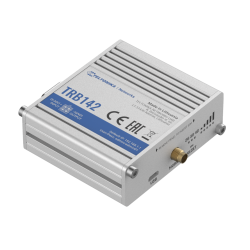

- chevron_left
- 1
- chevron_right
Votre avis ne peut pas être envoyé
Signaler le commentaire
Signalement envoyé
Votre signalement ne peut pas être envoyé.
Donnez votre avis
Avis envoyé
Votre avis ne peut être envoyé





